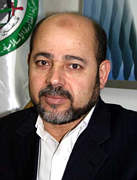Source: http://service.spiegel.de/cache/international/0,1518,424505,00.html
Mousa Mohammed Abu Marzook is second in command of the political Hamas leadership in Syrian exile. In an interview, he tells SPIEGEL ONLINE that the agreement with Fatah on the foundation of a Palestinian state does not mean that his organization will recognize Israel. Hamas, he say, will remain committed to violence against its occupier.
SPIEGEL ONLINE: Israel has accused the political office of Hamas of organizing the abduction of Israeli soldier Gilad Shalit. Was this kidnapping ordered by Damascus?
Abu Marzook: No, that is not true. Israel has often falsely accused us in similar instances. It is not our task to make such decisions: They are made by the military wing. The military and political wings work independently of each other.
SPIEGEL ONLINE: That means that the political leaders are not consulted prior to an action?
Abu Marzook: We are no experts here on military issues. We never know in advance about military actions, when or how they take place.
SPIEGEL ONLINE: That would indicate that there is no coordination between the wings of Hamas.
Abu Marzook: But of course there is, because our actions relate to the same strategy, under which everything is organized. And that strategy is to resist the occupation of Palestine. A part of Hamas pursues this goal politically, and another pursues it militarily.
SPIEGEL ONLINE: Now, Hamas has approved the so-called “Prisoners’ Paper,” which recommends a two-state solution. Does that mean that Hamas is now prepared to recognize the state of Israel?
Abu Marzook: With this agreement, we have primarily agreed to strengthen the resistance in the Gaza Strip and the West Bank. Aside from that, we have agreed on the goal of establishing a Palestinian state in these areas.
SPIEGEL ONLINE: Doesn’t that mean that Hamas inevitably accepts the Israeli state in the rest of that area?
Abu Marzook: The paper does not say that at all. It is purely about the future of our people and about how a government uniting all Palestinian factions can work on building their independent state.
SPIEGEL ONLINE: And does Hamas also believe that an Israeli state can exist alongside a Palestinian state?
Abu Marzook: Hamas has always said clearly: We will never accept the occupation, because it is not legal, not correct and not just.
SPIEGEL ONLINE: Hamas approved the agreement at the very moment the Israeli invasion began. Did Hamas hope that this concession would ward off the military action?
Abu Marzook: The one has nothing to do with the other. Hamas said from the start: 90 percent of the paper is good. But we wanted to push through some changes. For example, we insisted on including a paragraph that says that we will never recognize the legitimacy of the occupation. In addition, we wanted to more strongly emphasize that the Palestinians in the Gaza Strip and the West Bank have the right to resist. When Fatah accepted these changes, Hamas supported the paper.
SPIEGEL ONLINE: After the abduction of the soldier, Israel began to bomb Gaza. Would that not suggest that such actions only lead to violence against Palestinians?
Abu Marzook: The Israeli aggressions will never stop anyway. In the last two weeks alone, 11 Palestinian children have been killed in attacks. Now it is about one soldier who was taken in combat. And suddenly the whole world rises up and demands that he be set free. At the same time there are more than 400 Palestinian children in Israeli jails. No one asks about them.
SPIEGEL ONLINE: Looking at the consequences, one has to recognize that violence against Israel will never really help the Palestinian people.
Abu Marzook: Of course such actions help. Because every Israeli now knows that there will always be a reaction to violence. If Palestinians are killed, Israelis will be killed. That should be clear to all Israelis.
SPIEGEL ONLINE: It is hard to imagine that approach would ever bring an end to reciprocal violence.
Abu Marzook: No matter what, the violence will not stop. We are on the weaker side and we do whatever we can. The Palestinians have no other choice.
SPIEGEL ONLINE: The Palestinian head of government Ismail Haniyeh, also from Hamas, recently showed himself to be more diplomatic than the political leadership in Damascus. That suggests a certain lack of unity in Hamas.
Abu Marzook: No, there is no split, just various approaches. The government, the military wing and the political office all follow the same strategy, but each one works in a manner appropriate to his tasks.
SPIEGEL ONLINE: Now Hamas is no longer only a terrorist group or a resistance group, but also a governing party. Do you think — given all the chaos since the election success — that Hamas has carried out this transformation successfully?
Abu Marzook: Our task was not to change. The Palestinian people live under occupation, so we are still a resistance movement. The people elected us because they did not get the feeling that all the negotiations by Fatah had brought them closer to having their own state. We respect their choice, but we did not seek to be in the government.
SPIEGEL ONLINE: But now that Hamas is in the government: Should it not handle its conflicts with negotiations rather than attacks?
Abu Marzook: Of course. On the other hand, we are not a government like any other independent state. We are a government under occupation. And the task of such a government is to carry out resistance, in every possible way. I think that every single Palestinian should resist, and should keep it up until there is an independent Palestinian state.
SPIEGEL ONLINE: In other words, not even the current military attacks by Israel will lead Hamas to change its strategy?
Abu Marzook: No. I think that our strategy is a promising one, and that it will eventually bring the Palestinians to a point where they can build their own state.
Interview conducted by Gabriela Keller in Damascus, Syria



